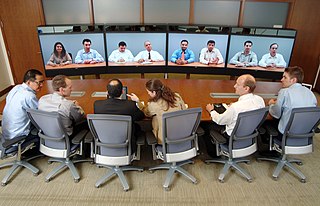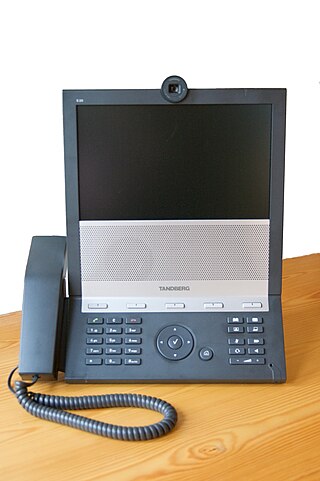
Tandberg was an electronics manufacturer located in Oslo, Norway and New York City, United States. The company began in the radio field, but became more widely known for their reel-to-reel tape recorders as well as cassette decks and televisions. The original company went bankrupt in 1978, after a sharp financial downturn. The following year, the company re-formed whilst their data division was split off as Tandberg Data, including the tape recording division, which reduced its scope to data recording.
Telepresence refers to a set of technologies which allow a person to feel as if they were present, to give the appearance or effect of being present via telerobotics, at a place other than their true location.

Webex by Cisco is an American company that develops and sells web conferencing, videoconferencing and contact center as a service applications. It was founded as WebEx in 1995 and taken over by Cisco Systems in 2007. Its headquarters are in San Jose, California.

Videotelephony is the use of audio and video for simultaneous two-way communication.

Radvision was a provider of video conferencing solution and enabling products for IP communication developers based in Tel Aviv, Israel. Radvision was acquired by Avaya in June 2012. Spirent Communications acquired Radvision's Technology Business Unit from Avaya in July 2014, to become Spirent Developer Tools Business Unit.

Poly Inc., formerly Polycom, is an American multinational corporation that develops video, voice and content collaboration and communication technology. Poly is a subsidiary of HP Inc.

Rowan Trollope is an American business executive and technology entrepreneur. He is the former CEO of Five9, a publicly traded cloud software company whom Zoom announced their intent to acquire in July 2021 The deal was terminated by mutual agreement on September 30, 2021.

Scopia, within the computer networking and telecommunications fields, is a series of unified communications products that provide meet-me, videoconferencing and online collaboration. The Scopia products include the Scopia XT Telepresence, Scopia XT7100 Room System, Scopia XT5000 Room System, Scopia XT4300 Room System, SCOPIA XT1000 Piccolo,XT Meeting Center Room System, Scopia Firewall Traversal, Multipoint control units, Gateways, Scopia Control, Scopia Desktop Video Conferencing, and Scopia Mobile HD Video Conferencing. The Scopia products are developed and sold by Avaya and their Business Partner network.
Unified communications (UC) is a business and marketing concept describing the integration of enterprise communication services such as instant messaging (chat), presence information, voice, mobility features, audio, web & video conferencing, fixed-mobile convergence (FMC), desktop sharing, data sharing, call control and speech recognition with non-real-time communication services such as unified messaging. UC is not necessarily a single product, but a set of products that provides a consistent unified user interface and user experience across multiple devices and media types.

Anybots Inc. is an American robotics company based in Santa Clara, California. It was founded in 2001 by Trevor Blackwell.

Lifesize is a video and audio telecommunications company in the United States which provides high definition videoconferencing endpoints and accessories, touchscreen conference room phones, a cloud-based video collaboration platform, and omnichannel contact center solutions under their CxEngage product line. Lifesize's headquarters is located in Austin, Texas. Its Europe, Middle East and Africa regional office is located in Munich, Germany.

The E20 is an entry-level personal videoconferencing system produced by the Norwegian company Tandberg.

The Tandberg C90 is a videoconferencing codec and telepresence engine produced by the Norwegian company Tandberg. It is used as the basis for Tandberg's telepresence solutions T1 and T3.
VenueGen is a browser-based web conferencing service created and marketed by The Venue Network. It is a 3D virtual meeting software that enables users to interact with each other using avatars. Users can host and attend meetings, conferences, and training with other colleagues and upload rich media into virtual meeting rooms for real-time collaboration.
Mobile collaboration is a technology-based process of communicating using electronic assets and accompanying software designed for use in remote locations. Newest generation hand-held electronic devices feature video, audio, and telestration capabilities broadcast over secure networks, enabling multi-party conferencing in real time.
Librestream Technologies Inc. is a privately owned, venture capital–backed company based in Winnipeg, Canada. Librestream provides technologies that enable mobile and remote enterprise collaboration.

OpenQwaq is open source computer software for immersive collaboration, which enables organizations to implement online 3D virtual world workspaces for their specific needs. OpenQwaq is based on the Teleplace technology, a conferencing platform that has been in the market since 2007, with the name Qwaq Forums until 2009.
StarLeaf was a global video conferencing and collaboration software company that provided cloud-based Instant messaging, meeting and calling for business users. StarLeaf enabled people to meet and collaborate from their desktop and mobile devices, as well as via proprietary StarLeaf and third-party meeting room systems. The company was headquartered near Watford, UK, with offices throughout Europe, the Americas and Australasia.












